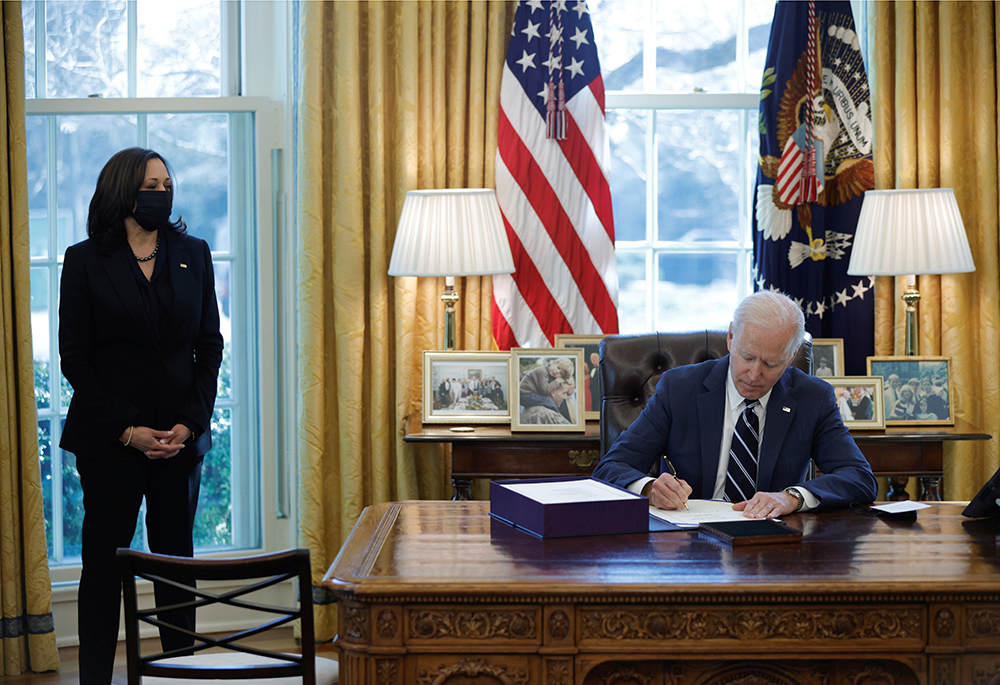
President Joe Biden signs the American Rescue Plan into law at the White House in Washington March 11, 2021. Also pictured is Vice President Kamala Harris. (CNS/Reuters/Tom Brenner)
As President Joe Biden approaches the end of his presidency, he can leave a lasting legacy of mercy and compassion by granting clemency to all federal inmates on death row. This bold act would fulfill one of the most significant tenets of his Catholic faith.
There are 40 federal inmates on death row in the United States, most housed at the United States Penitentiary in Terre Haute, Indiana, according to the Death Penalty Information Center. Under Biden, the federal government has imposed a moratorium on executions.
In 1845, the 19th-century theologian John Henry Newman published his groundbreaking work, An Essay on the Development of Christian Doctrine. Newman proposed that the church's understanding of doctrine evolves. While doctrine remains rooted in its apostolic origins, it must develop in response to new circumstances and deeper insights. Newman's theory, once revolutionary, is now a cornerstone of Catholic thought.
Such a bold act of reconciliation would remind the nation that justice is not about retribution but redemption and the restoration of human dignity.
The church's stance on capital punishment offers one of the clearest examples of doctrinal development. What began as a reluctant acceptance of the death penalty has gradually transformed into a firm and unwavering condemnation.
Pope John XXIII's 1963 encyclical Pacem in Terris ("Peace on Earth") marked a significant shift in the church's approach to social issues and peace. It emphasized human dignity, rights, and the importance of international cooperation for peace.
Pope Paul VI, in his 1971 apostolic letter Octogesima Adveniens ("Eightieth Anniversary Approaches") urged a global move toward the elimination of the death penalty, acknowledging its degrading effects on society and human dignity.
Pope John Paul II's 1995 encyclical Evangelium Vitae ("The Gospel of Life") declared that cases justifying the death penalty should be "sporadic, if not practically nonexistent."
While Pope Benedict XVI did not issue a specific encyclical on the topic, he advocated for limiting and abolishing the death penalty where possible, in line with his predecessors' teachings.
In 1980, the U.S. bishops released "The Death Penalty: An Appraisal," which expressed moral concerns about the practice and underscored the potential for errors and injustices within the legal system. Four years later, they issued a more robust statement arguing that capital punishment was no longer necessary due to modern incarceration methods. In 2005, the U.S. bishops published "A Culture of Life and the Penalty of Death," a powerful call for the abolition of the death penalty. This statement framed capital punishment as fundamentally incompatible with the dignity of the human person, aligning with the teachings of Pope John Paul II.
These shifts culminated in Pope Francis' landmark 2018 change to the Catechism of the Catholic Church, which declared the death penalty "inadmissible" in all cases, reflecting a broader change in Catholic teaching. For Pope Francis, mercy has become the defining hallmark of his pontificate, challenging the church — and the world — to embrace the sanctity of life in all its forms.
Advertisement
President Biden, a practicing Catholic, has already aligned his policies with this evolving understanding. In July 2021, the president imposed a moratorium on federal executions. The decision was in keeping with his long-standing opposition to capital punishment, rooted in his faith and belief in the dignity of every human life. Biden's stance mirrors the growing consensus within the church and civil society that the death penalty is both morally flawed and ineffective in promoting justice.
The journey from a moratorium to full pardon for all federal death row inmates would be a natural and powerful next step. It would reflect a personal evolution in Biden's understanding of mercy and justice and underscore his commitment to a more compassionate and just society. Just as the church has evolved, so too can Biden evolve from limiting executions to offering a profound act of compassion, fully embodying the Catholic principle of mercy.
Biden could make a powerful moral and political statement by ending the era of state-sponsored executions. Such a bold act of reconciliation would remind the nation that justice is not about retribution but redemption and the restoration of human dignity.
The act of granting pardons would serve as a Biden administration bookend to the American Rescue Plan Act. Enacted at the beginning of his term, the legislation aimed to rescue Americans from the economic devastation of the pandemic. Acts of economic and legal mercy speak to the same underlying commitment to alleviate suffering and build a more compassionate society. In both cases, Biden's actions reflect his core belief in compassion and mercy, rooted in his Catholic faith.
Catholic teaching has long emphasized that we are all on a journey of moral growth, individually and collectively. The evolution of church doctrine on the death penalty reflects this truth. Mercy, after all, is not static; it is a living principle that grows and deepens in response to new challenges and revelations.
On Sunday, Dec. 1, Biden granted the ultimate act of mercy to his son, Hunter — a full and unconditional pardon. The pardon of his son was controversial. However, offering clemency for those sentenced to death should not be controversial at all. These would not be pardons but reduced sentences, and inmates would remain in prison if their sentences were reduced from death.
By granting clemency to all federal inmates on death row, Biden could embody the most profound teachings of his faith and leave a legacy of compassion that will resonate for years. It would be a fitting conclusion to a presidency built on compassion and a testament to the transformative power of Catholic teaching on human dignity.






